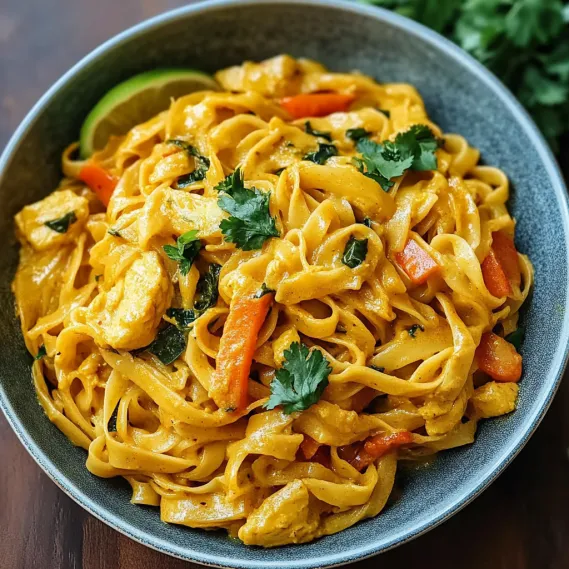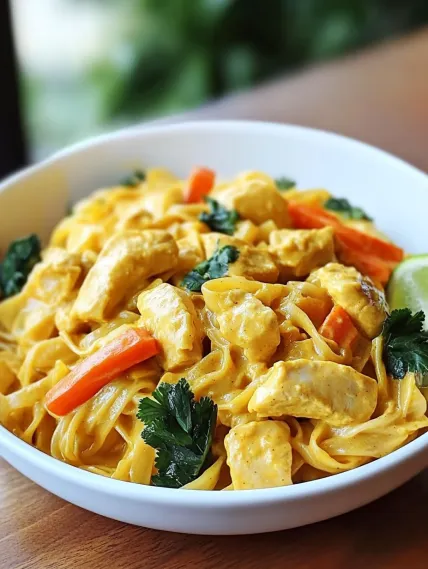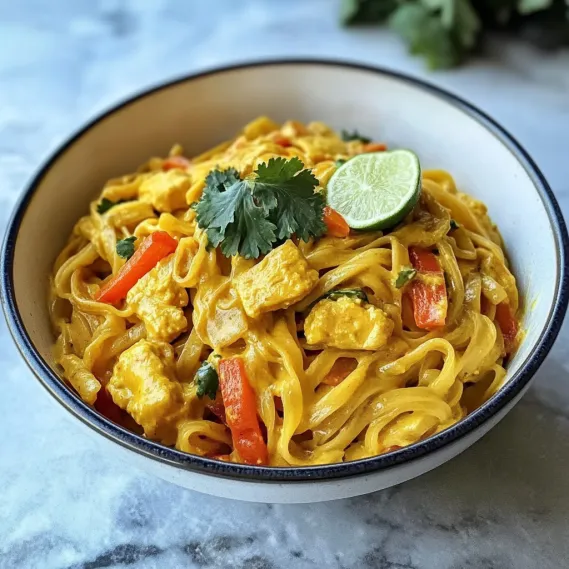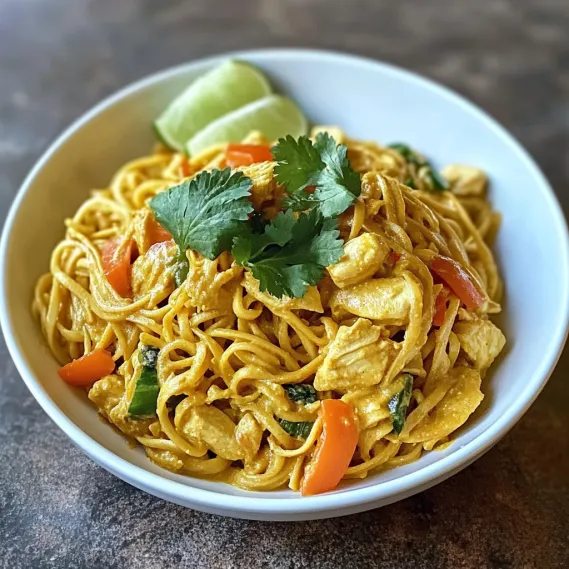 Pin it
Pin it
These quick-fix 15-minute Yellow Curry Noodles blend smooth coconut milk with bold curry tastes, soft rice noodles, and bright veggies. Each mouthful gives you the right mix of heat, kick, and different textures. This meal cuts corners on time but not on taste, making it perfect for crazy weeknights when you want something good without spending ages cooking.
I stumbled on this dish during a super busy work period when I needed fast, healthy food. What began as just using up pantry odds and ends turned into my family's top dinner request. Even my kids who normally push veggies around their plate gobble these noodles up, which makes it a real hit in our home.
Key Ingredients and Shopping Advice
- Rice Noodles: Pick either wide or skinny kinds depending on what you like. Go with whatever's fresh.
- Yellow Curry Paste: Brands like Mae Ploy and Maesri give you real authentic flavor. Reduced-fat options work too but won't be as thick.
- Coconut Milk: Regular makes the creamiest sauce. Diet versions still taste good but make a thinner mix.
- Fresh Vegetables: Bright peppers, carrots, and sugar snap peas add health benefits and crunch. Pick whatever looks good at the store.
- Fresh Aromatics: Fresh ginger and garlic bring that needed zing. Try not to use dried versions if you can help it.
I've noticed that mixing in a spoonful of peanut butter to the curry makes it taste even better, reminding me of my favorite Thai place. This tiny change adds a richness that makes these quick noodles taste like they've been cooking forever.
Step-by-Step Cooking Guide
- Step 1: Get Your Noodles Ready
- Put lots of water in a big pot and turn the heat up high until it boils. Toss in 8 ounces of rice noodles and cook them following the package directions, usually about 3-4 minutes until they're soft but still have some bite. Drain them right away and run cold water over them to stop them cooking more and sticking together.
- Step 2: Cook Your Flavor Base
- Pour 1 tablespoon of olive oil into a big wok or pan over medium heat until it starts to shimmer. Throw in 1 small chopped onion and cook for 2-3 minutes until it gets soft and see-through, then add 2 crushed garlic cloves and 1 tablespoon fresh grated ginger, cooking one more minute until they smell good but don't turn brown.
- Step 3: Build Your Curry Foundation
- Put 2 tablespoons yellow curry paste in with your onion mix, stirring all the time to coat everything and keep it from burning. Cook for 1-2 minutes until the paste gets a bit darker and smells stronger, which helps make the final dish tastier and gets all the spice oils flowing.
- Step 4: Make Your Sauce Just Right
- Add one 14-ounce can of coconut milk, 1 tablespoon soy sauce, and 1 tablespoon sugar, stirring well to mix the curry paste into the liquid. Let it come to a gentle bubble, cooking for 2-3 minutes until it thickens a little and the flavors start coming together.
- Step 5: Put It All Together
- Toss 2 cups of mixed veggies into your bubbling sauce, cooking just until they're tender but still crunchy, about 3-5 minutes depending on what veggies you used. Carefully mix in your cooked rice noodles, tossing until they're totally covered with curry sauce, then take it off the heat and sprinkle with fresh cilantro and lime wedges before serving right away.
 Pin it
Pin it
I figured out how important the right filling thickness is through lots of mess-ups. My first tries were way too runny, and I got soggy bottom crusts that fell apart. Now I always make sure the filling gets thick enough and cools down a bit before I put everything together, and it makes such a difference in how it turns out. My family can tell and loves this extra care, especially my husband who used to prefer restaurant pies but now asks me to make this recipe all the time.
 Pin it
Pin it
Outstanding Weeknight Answer
This pie has become our winter Sunday dinner tradition. There's something really comforting about making it while everyone gathers around, drawn in by the amazing smells promising good food soon. I often make the filling in the morning, letting the flavors mix together all day before putting it all together and baking just before dinner. Everyone gets excited as the pastry puffs up and turns golden in the oven, filling our home with an amazing smell that tells you something delicious is coming.
Adaptable Meal-Planning Champion
With food costs going up, this pie has gotten even more important in our meal planning. The ingredients are cheap basics that feed lots of hungry people. I often grab ground beef when it's on sale just for this recipe. Potatoes and onions don't cost much, and though puff pastry isn't the cheapest thing, it turns these simple ingredients into something that feels special. When surprise guests showed up for dinner last month, I just added more potatoes and veggies to stretch the filling, and nobody went hungry. This pie's ability to fill everyone up without breaking the bank makes it super valuable during tight money times.
Great for Friends and Gifts
The sharing nature of this pie makes it my first choice when helping friends and neighbors through tough times or celebrations. When my neighbor had surgery, I brought over a fully cooked pie her family could just warm up. For new parents nearby, I drop off uncooked pies with baking instructions, giving them home cooking without the work. These pies have become what I'm known for in our neighborhood, building friendships through shared meals. The thankful messages I get show that this simple dish brings not just food but comfort when people need it, which proves food really can show care and support.
Cook's Clever Tricks
- For extra taste, add a splash of Irish stout beer when you pour in the broth
- Make smaller hand pies for easy lunches or potluck dishes
- Add a dash of Worcestershire sauce to make the flavor deeper
- Grate some Irish cheddar into the mix for a hint of cheese
- Use cookie cutters on leftover pastry to make cute shapes for topping your pie
I've been tweaking versions of this pie for more than ten years, always trying to make it better. The biggest improvement came when I started using the broiler at the end for the salmon, getting that perfect mix of crispy outside and juicy inside.
 Pin it
Pin it
These Yellow Curry Noodles show that sometimes the most unforgettable meals come from respecting basic ingredients with simple cooking methods that let their natural flavors really stand out.
Frequently Asked Questions
- → Can I make this gluten-free?
- Of course! Just swap out regular soy sauce for tamari or coconut aminos. Also, make sure the curry paste you’re using doesn’t have any gluten—many Thai brands are naturally gluten-free, but it’s always worth double-checking.
- → What veggies go well in this dish?
- It's super customizable! Try bell peppers, carrots, zucchini, baby corn, snap peas, or broccoli. For faster cooking, cut them thin and even. Greens like spinach or bok choy can go in at the last minute!
- → Can I toss in some protein?
- Definitely! Tofu, shrimp, chicken, or even beef would work great. For tofu, press and pan-fry first. For meats, cook them until almost done separately, then add them back in when you mix everything together.
- → Where can I get yellow curry paste?
- Check the international or Asian foods aisle at bigger stores, or head to an Asian market. Brands like Mae Ploy or Thai Kitchen work well. No yellow curry paste? Mix red curry paste with a pinch of turmeric instead!
- → How do I tone down the heat?
- Use less curry paste (start with one tablespoon), and use full-fat coconut milk to smooth everything out. A dash of sugar can also help balance things. Spice fans can turn it up with chili slices or red pepper flakes.
